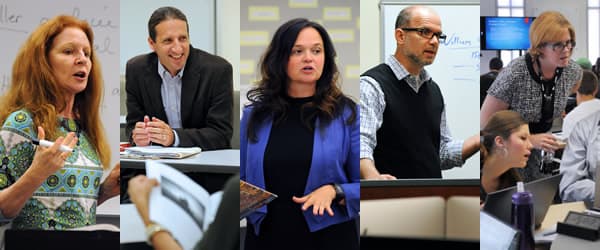
Faculty members who demonstrate significant impact within and beyond their classrooms can be recognized with one of UNC Charlotte’s top honors – the Bank of America Award for Teaching Excellence. Finalists for the golden jubilee presentation of this award are Michèle Bissière, Scott Fitzgerald, Amy Good, Kirk Melnikoff and Coral Wayland. The 50th anniversary Bank of America Award for Teaching Excellence recipient will be named at a ceremony Friday, Sept. 8.
Since joining the UNC Charlotte faculty in 1990, Bissière, a professor in the Department of Languages and Culture Studies, has developed 12 courses with most in the French curriculum, including language, advanced literature, culture, civilization and film.
However, according to her colleagues, it is what is not listed on paper that makes Bissière a truly exceptional teacher. Colleagues frequently state that because of her enthusiasm, integrity and work ethic, Bissière has supported every major programmatic initiative during the last two decades. Her outreach has been so diverse and extensive that she is the face of French at UNC Charlotte. As a leader in the Department of Languages and Culture Studies, Bissière founded the French Club and established the internship program, which regularly places students in area schools to assist instructors teaching French; she encourages students to volunteer within local schools and for the Bechtler Museum of Modern Art. Finally, she single-handedly started the International Film Festival.
Fitzgerald, an associate professor of sociology, when asked about his profession, said, “I am an educator.” Whether he is in the classroom, giving a research talk at a conference, a public talk in the community or discussing curriculum development with colleagues, he is driven by a commitment to develop and share knowledge.
He led the department’s efforts to develop service-learning opportunities and was instrumental in developing the Sociology Department’s Global Village Learning Community, a one-year nonresidential program designed to introduce freshmen to the concept of globalization. Students in the program participate in community engagement activities on and off campus. Fitzgerald also has developed a civically engaged program in Manchester, England, and co-leads the Habitat for Humanity Study Abroad program in El Salvador. This cutting-edge program combines experiential learning with global learning and the development of an intellectual community.
Good, associate professor in the Department of Reading and Elementary Education, comes from a family of strong educators. She volunteered in her mother’s classroom, and her dad taught her how to advocate for the teaching profession as an elected state school board member. Using the foundation established within the Cato College of Education's Conceptual Framework, Good seeks to provide opportunities for teacher candidates to develop the knowledge, effectiveness and commitment necessary to help transform the lives of children in their classrooms.
Reaffirming her philosophy focused on authentic learning, Good, in her courses, includes a field-based (clinical) component that enables teacher candidates to observe and demonstrate effective teaching skills. Through these experiences, they learn to plan instruction based on state and national standards, set goals and write objectives linked to assessment. They experience creating a classroom community; they observe and practice the steps to integrate curriculum and are introduced to the importance of assessment within the social studies curriculum.
An associate professor of English, arriving at UNC Charlotte in 2002, Melnikoff has taught 23 different courses, showing the breadth of his expertise and interests. His area of expertise is in 16th-century English literature with a focus on genre, drama, performance and print culture as well as academic writing. Melnikoff noted, “The love of learning is infectious, and if I’m not ever curious, deeply inspired, it’s often the case that my students won’t be either. Engagement requires a variety of catalysts, and to that end, I have always pursued an interdisciplinary perspective and tried to offer a variety of intellectual supplements to classroom work.”
These supplements include performances, workshops, talks, brown bags, requisite office visits and readings. Drama is not only meant to be read but also to be performed, and Melnikoff provides his students with opportunities to work with theater. He regularly takes students in his upper-level Shakespeare courses on overnight trips to the American Shakespeare Center in Staunton, Virginia. There his students see productions and participate in workshops with company actors.
Wayland, associate professor of anthropology, is a self-described “recovering lecturer.” When she arrived at UNC Charlotte in 1998, she admits she was taught how to be an anthropologist but was never taught how to teach anthropology.
While teaching anthropological content used to be one of her top goals, Wayland now focuses on developing students’ 21st century skills: collaboration, critical thinking, creativity and communication. She developed team-based, student-centered learning in open classrooms. This approach effectively charges students with creating their own intellectual explorations by having them choose their own realms of inquiry and creating their own learning material – effectively “flipping” classroom roles. And she demonstrates an avid willingness to impart her skills and insights to her fellow faculty members with the goal of creating an ever-improving teaching and learning environment for students and faculty alike. Since 2013, Wayland has served as a Faculty Fellow in the Center for Teaching and Learning, where she designs and leads workshops to encourage more imaginative and effective teaching and to create innovative learning programs.
The Bank of America Award for Teaching Excellence was first presented in 1968 to recognize outstanding faculty members at UNC Charlotte. It was established in response to a suggestion by the staff of the student literary magazine. Bonnie E. Cone and W. Hugh McEniry, vice chancellors at the time, endorsed the students' proposal for the annual award and presented it to Chancellor Dean Colvard. He found financial support for the award through the generosity of Addison Reese and NCNB, a predecessor to NationsBank and Bank of America.